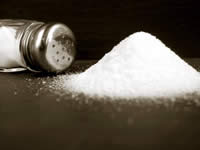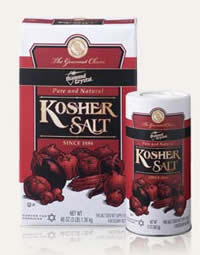Difference between Table Salt and Kosher Salt
Key Difference: Table salt is refined salt that has fine grains of salt. It has a smooth texture and small granules, similar to sand. Table salt is mined and harvested under the ground from the salt deposits. Kosher salt (also known as sea salt in some places) is directly harvested from the seas. Sea water is allowed to flow into a man-made ground area, which is then evaporated and the salt is then mined from there.
Salt is an important ingredient in cooking which gives many dishes its prime flavor. In addition to cooking it is also plays an important part in preservation, funeral offerings (during the old Egyptian times), to remove blood from meat and in cosmetics. There are different types of salt that are available in the market, the most common one being table salt. Though, table salt and kosher salt are similar in nature, they differ in the way that they are processed.

Table salt is refined salt that has fine grains of salt. It has a smooth texture and small granules, similar to sand. Table salt is mined and harvested under the ground from the salt deposits. Table salt has a sharp taste. It contains about 97% to 99% sodium chloride and also has anticaking agents such as sodium aluminosilicate or magnesium carbonate, in order to keep it from clumping. When it is added to the salt shakers, grains of rice or a saltine cracker is added to keep out extra moisture from forming clumps in the salt. Table salt has a particle density of 2.165 g/cm3, and a bulk density of about 1.154 g/cm3.
Table salt can be iodized or plain. Iodized salt is basically table salt that has been mixed with a minute amount of potassium iodide, sodium iodide, or sodium iodate. It may also include a small amount of dextrose may also be added to stabilize the iodine. Iodized salt is promoted in order to keep people from suffering from iodine deficiency. Iodine can prevent mental retardation and formation of thyroid goiters.
 Kosher salt (also known as sea salt in some places) is directly harvested from the seas. Sea water is allowed to flow into a man-made ground area, which is then evaporated and the salt is then mined from there. Kosher salt is not advised to be used in cooking, but rather as a garnish, as it loses its flavor when it is cooked or dissolved. The name kosher salt is not because it is made in accordance with the guidelines for kosher foods, but because it helps make meat kosher by removing surface blood from it.
Kosher salt (also known as sea salt in some places) is directly harvested from the seas. Sea water is allowed to flow into a man-made ground area, which is then evaporated and the salt is then mined from there. Kosher salt is not advised to be used in cooking, but rather as a garnish, as it loses its flavor when it is cooked or dissolved. The name kosher salt is not because it is made in accordance with the guidelines for kosher foods, but because it helps make meat kosher by removing surface blood from it.
Kosher salt does not include any preservatives and is more commonly used as a preservative because of its large crystals. Many cooks prefer using kosher salt as a garnish or seasoning due to their coarse texture and the crunch that it provides when bit into. Kosher salt is also used in order to draw blood from meat and to preserve it as it more effective than the small grains of refined salt. Kosher salt melts must easier and is also lighter than table salt.
Image Courtesy: longevitystrategist.com, diamondcrystalsalt.com









Add new comment